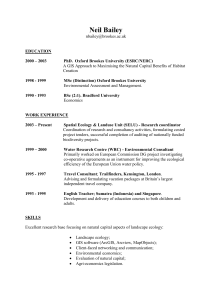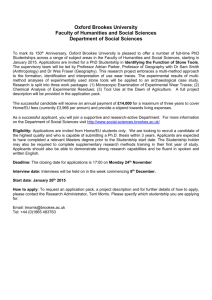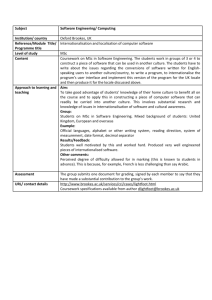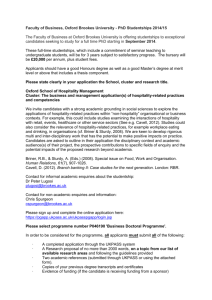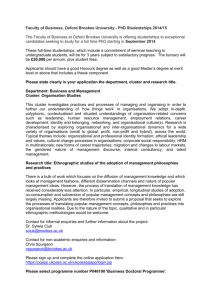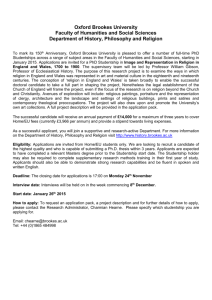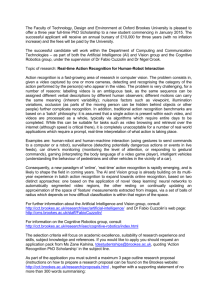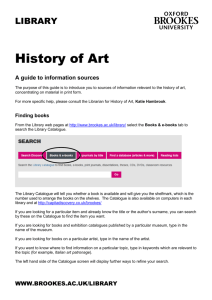English literature - Oxford Brookes University
advertisement
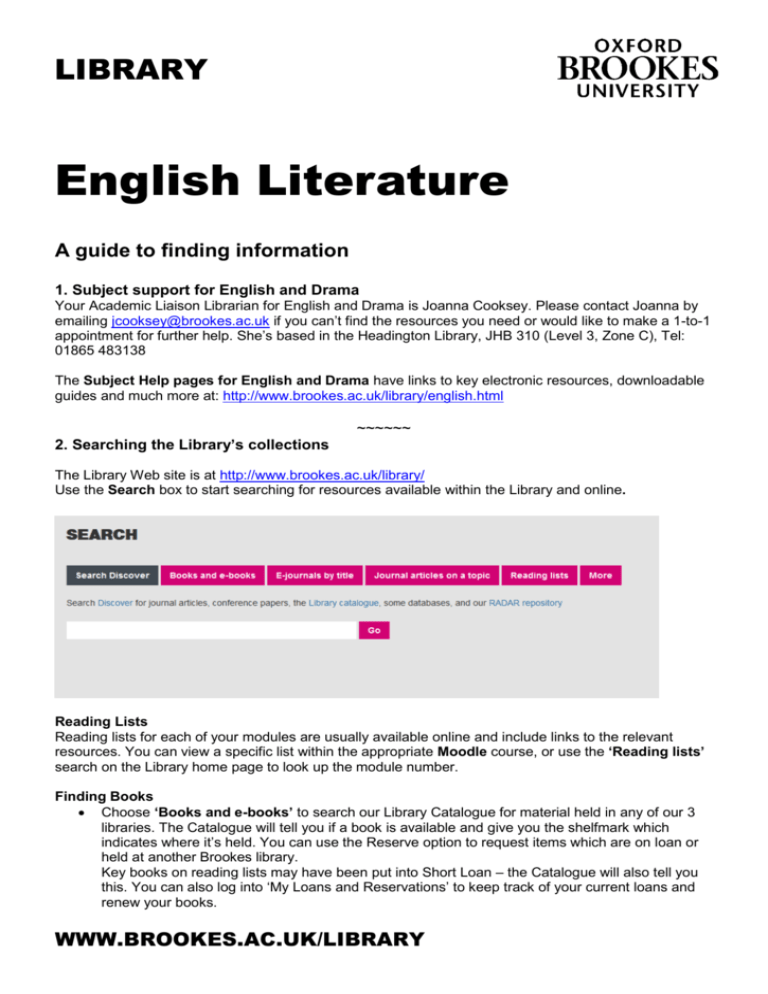
LIBRARY English Literature A guide to finding information 1. Subject support for English and Drama Your Academic Liaison Librarian for English and Drama is Joanna Cooksey. Please contact Joanna by emailing jcooksey@brookes.ac.uk if you can’t find the resources you need or would like to make a 1-to-1 appointment for further help. She’s based in the Headington Library, JHB 310 (Level 3, Zone C), Tel: 01865 483138 The Subject Help pages for English and Drama have links to key electronic resources, downloadable guides and much more at: http://www.brookes.ac.uk/library/english.html ~~~~~~ 2. Searching the Library’s collections The Library Web site is at http://www.brookes.ac.uk/library/ Use the Search box to start searching for resources available within the Library and online. Reading Lists Reading lists for each of your modules are usually available online and include links to the relevant resources. You can view a specific list within the appropriate Moodle course, or use the ‘Reading lists’ search on the Library home page to look up the module number. Finding Books Choose ‘Books and e-books’ to search our Library Catalogue for material held in any of our 3 libraries. The Catalogue will tell you if a book is available and give you the shelfmark which indicates where it’s held. You can use the Reserve option to request items which are on loan or held at another Brookes library. Key books on reading lists may have been put into Short Loan – the Catalogue will also tell you this. You can also log into ‘My Loans and Reservations’ to keep track of your current loans and renew your books. WWW.BROOKES.AC.UK/LIBRARY E-books are also listed on the Library Catalogue. You will need to log in with your Brookes student number and portal password when prompted. Our e-books are on various different platforms so options for viewing and downloading will vary. Here are some useful sections of the Library for students of English Literature, Creative Writing and Drama: Literature and literary theory The main literature section is on Level 4: 801 Literary theory 808 Anthologies 809 History and criticism of literature 810 American literature 820 English literature: general 821 English poetry 822 English drama 823 English fiction Each of these numbers is further divided by time period e.g. Victorian fiction 823.8 Modern fiction 823.92 Individual authors, such as Dickens, have their own works followed by critical works and biographies e.g. 823.8 DIC for Dickens - Great Expectations 823.8 DIC/P for Lyn Pykett’s Charles Dickens: critical issues 823.8 DIC/T for Claire Tomalin’s biography Charles Dickens: a life Other useful sections: 028 (Level 2) Reading and reviews 791.4309 (Level 4) Film 791.437 Film adaptations 792 Theatre 808.02 Creative writing 808.1 Writing poetry 808.2 Writing drama 808.3 Writing fiction Open access special collections: Oxford Brookes Poetry Centre Collection – Level 4. Find out more about this collection at http://www.brookes.ac.uk/library/english/poetrycoll.html Booker Prize shortlisted titles – Level 4 Africa Publishing Collection – Level 2, Mobile Shelving. ~~~~~~ 3. Starting research: reference works The Library holds a wide range of reference works such as specialised dictionaries and encyclopaedias, which can offer a useful starting point for your research. They may be helpful for getting an overview of a subject, looking up unfamiliar terms, or finding details about a specific writer. Printed reference sources include: Burwick, F. et al (eds.) (2012). The encyclopedia of Romantic literature. 820.9007/ENC Childs, P. and Fowler, R. (eds.) (2006). The Routledge dictionary of literary terms. 803/ROU Cox, M. (ed.) (2002) The Oxford chronology of English literature. 820.202/OXF Greene, R. et al (eds.) (2012). The Princeton encyclopedia of poetry and poetics. 4th ed. 808.103/PRI International who's who of authors and writers. (Annual publication). 809/INT Knowles, E. (ed.) (2004) The Oxford dictionary of quotations. 6th ed. 808.882/OXF Logan, P.M. et al (eds.) (2011). The encyclopedia of the novel. 809.3003/ENC Nieland, J. et al (eds.) (2011) The encyclopedia of twentieth-century fiction.809.304/ENC 2 Wolfreys, J. (ed.) (2002) The Edinburgh encyclopaedia of modern criticism and theory. 801.95/EDI The writer’s handbook. (Annual publication). 808.02/WRI Online reference sources Connect to these e-resources via the Databases for English and Drama page at http://www.brookes.ac.uk/library/english/engdata.html Dictionary of national biography Collection of articles providing the life stories of over 50,000 people who have shaped the history of the British Isles and beyond, from the earliest times to those who died in the year 2000. Includes novelists, poets and playwrights. Oxford English Dictionary Online The online version of the classic English dictionary. Oxford Reference Online Online collection of around 200 dictionary and subject reference works published by Oxford University Press. You can search the entire collection, or browse for a specific work. Their collection on Literature includes works on: Literary terms; Twentieth-century literature in English; British Literature; Irish Literature; American Literature and African American Literature; Crime and Mystery Writing ~~~~~~ 4. Journals and Databases Journals provide one of the best sources of information on current research, discussion and specialised literary topics. The Library subscribes to a wide range of journals for English Studies from academic journals such as ELH: a journal of English literary history and Victorian poetry, to review journals such as The Times Literary Supplement, The London Review of Books and The New York Times Review of Books. Print journals are listed on the Catalogue and shelved in the Library Basement. If you have to find your own sources (articles, book chapters) for an essay or a dissertation, try searching Discover or one of the databases recommended for English and Drama. On the Library home page: ‘Search Discover’ is a good place to start. Just type in keywords and/or authors to find books and journal articles listed all in one place. Discover searches the Catalogue and many – but not all - of our databases. You can filter your results to focus on specific sources such as books or articles. ‘E-journals by title’ lets you search our complete list of e-journals. Use this option to see if we hold a specific e-journal and connect to it. ‘Journal articles on a topic’ allows you to access our complete list of databases. 3 Subject Help: The Subject Help pages for English and Drama will give you links to a range of databases and online collections. Choose the ‘Subject Help’ link on the Library home page or go directly to at http://www.brookes.ac.uk/library/english.html Key databases JSTOR (full-text) Archive of articles from a range of academic journals in a wide range of humanities and social sciences disciplines. MLA international bibliography Covers literature, languages, linguistics and folklore. The International index of performing arts (IIPA)- covers all areas of the performing arts including theatre and film. British Periodicals (full-text) provides access to the searchable full text of hundreds of periodicals from the late seventeenth century to the early twentieth. Nineteenth century UK periodicals online. Contains digital editions of some 100 UK periodicals published between 1800 and 1900. Some databases such as JSTOR give you the full text of articles, often in the form of PDF files that you can save or print. Other databases such as MLA international bibliography will give you an ‘abstract’ or summary of the article but not the whole thing. The next step is to find out whether the Library holds that article in print or electronic form. If you see the LinkSource icon next to a reference you can click on this to check whether the article is available as an e-journal and then link to it. 4 Note that databases may cover journals and other publications which are not held available from the Brookes Library. See section 6 for how to access material from other libraries. Finding newspaper articles For articles and reviews from current newspapers, try LexisLibrary (UK news sources), or Factiva (international news database). We also have these digital archives of historical newspapers: The Guardian and The Observer (1791 - 2003). Times Digital Archive (1785-2007). Seventeenth & Eighteenth century Burney Collection newspapers Nineteenth century British Library newspapers (via Gale Databases). Contains digital editions of 48 national and regional British newspapers from the 19th century. TV and radio programmes Box of Broadcasts (BoB) lets you view and record radio and TV programmes, including films. Historical books JISC Historic Books has the full text of over 350,000 books published in Great Britain from 1475-1900. It consists of 3 databases which can be searched individually or together: Early English books online (EEBO) contains digital facsimile page images of virtually every work printed in England, Ireland, Scotland, Wales and British North America and works in English printed elsewhere from 1473-1700. Eighteenth century collections online (EECO) contains digital images of 150,000 books published during the 18th Century. Nineteenth century books from the British Library collection gives full text access to over 65,000 19th Century books. Need help? Go to the Library Subject Help pages for English and Drama at http://www.brookes.ac.uk/library/english.html and choose Journals and Databases for tips on locating articles. You’re welcome to contact your Academic Liaison Librarian for 1-to-1 help with searching databases. ~~~~~~ 5. Referencing in the MHRA style Citing your sources - also called referencing - is an essential part of your academic work. The English and Drama Department recommends using the MHRA (Modern Humanities Research Association) referencing style. For help with referencing: The Library guide Citing your references using the MHRA style: A guide for English and Drama students gives tips on how to reference your work and present a bibliography in this style. It’s available from the Library Subject Help pages for English and Drama at http://www.brookes.ac.uk/library/english.html Full details about the MHRA style can be found in the official MHRA Style Guide. The latest version can be downloaded directly from the MHRA (Modern Humanities Research Association) web site at http://www.mhra.org.uk/Publications/Books/StyleGuide/download.shtml The printed version MHRA Style Guide (3rd ed, 2013) is available in Headington Library, shelved at 808.02/MOD. ~~~~~~ 6. Study and research skills Go to the Library Subject Help pages for English and Drama at http://www.brookes.ac.uk/library/english.html and choose Finding information for help with doing different kinds of study and research, including Literature searching for your English dissertation. You are always welcome to contact your Academic Liaison Librarian for help with finding sources for assignments, essays or your dissertation. 5 When doing research for an in-depth project such as your dissertation you are likely to come across references to publications which are not held at Oxford Brookes Library. The Interlibrary Loan service will be able to supply you with most other items you need. We make a charge for every item we provide for you. Journal articles can usually be supplied in 3 working days; other materials will take longer. Dissertation-level undergraduate students, postgraduates, researchers and staff are entitled to join the Bodleian Library at Oxford University. Ask at the Library Help Zone for an application form or download one from our Web pages at http://www.brookes.ac.uk/library/otherlib/univoxford.html You can search the Bodleian Catalogue SOLO at http://www.bodleian.ox.ac.uk/bodley ~~~~~~ Last but not least… Don’t forget that help is available in using the Library and its resources throughout your time at Brookes: Go to the Subject Help pages for English and Drama at http://www.brookes.ac.uk/library/english.html to find links to key-e-resources and much more. Your Academic Liaison Librarian, Joanna Cooksey, is always willing to help you. JC english.doc rev. 09/15 6
